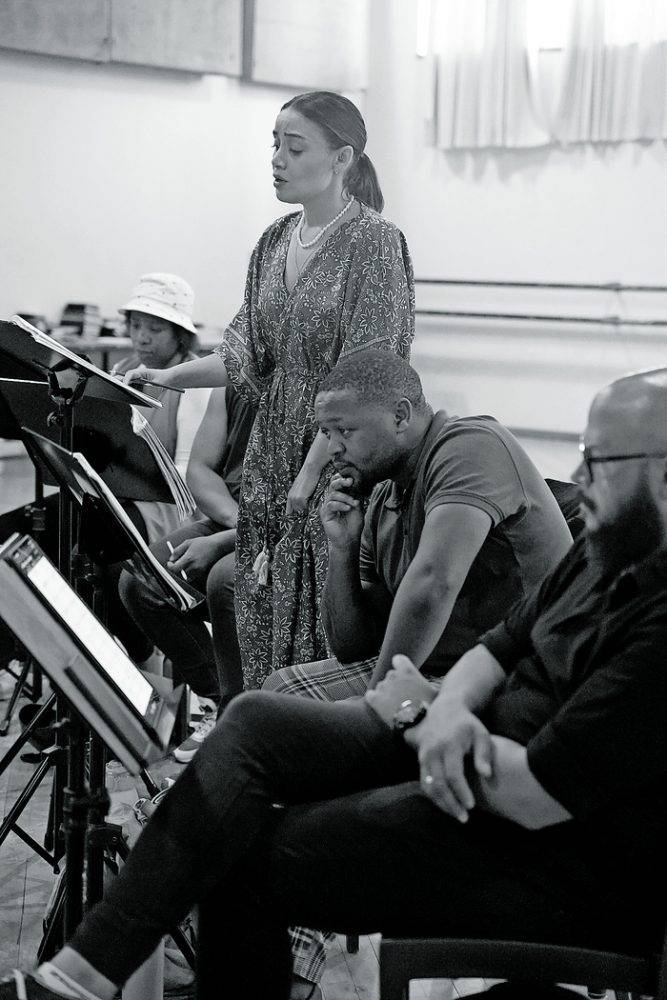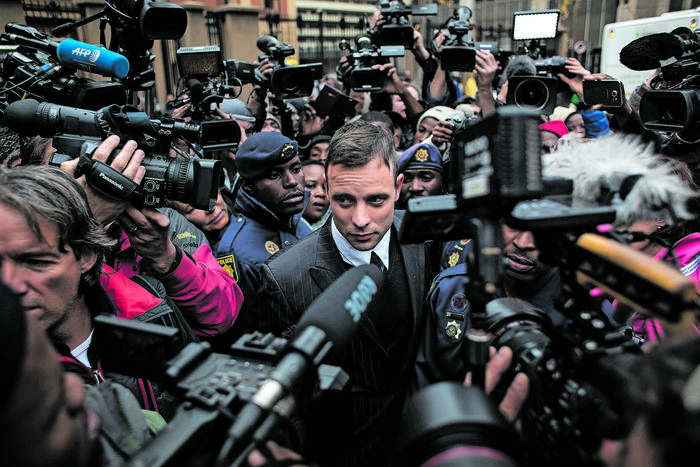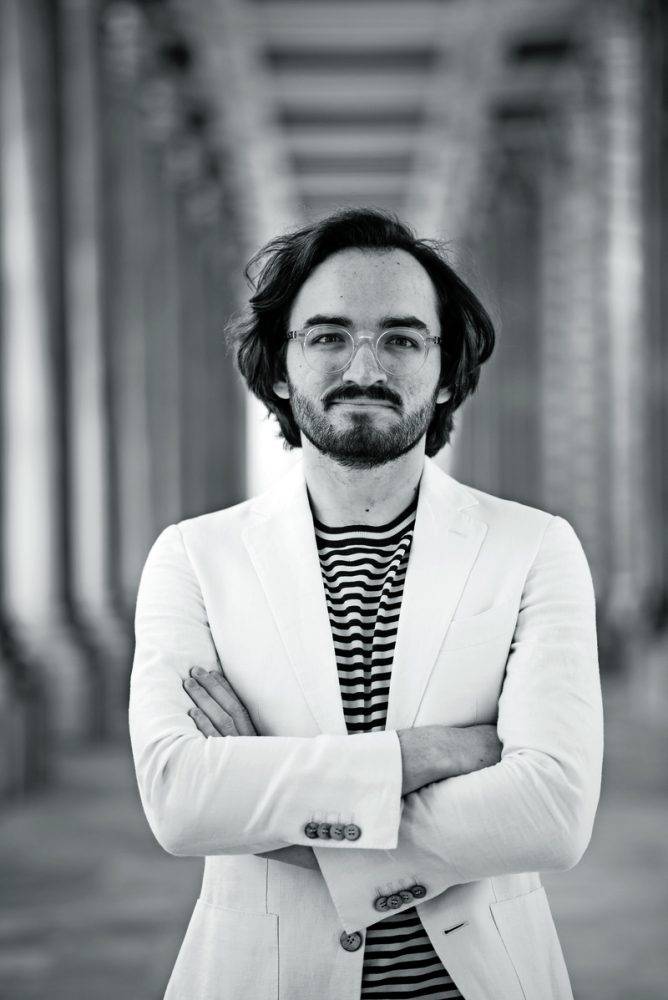
Conrad Asman says the worst thing you can ask a composer is to explain what music is.
“It’s not something we can agree on, so most composers hate answering that question.”
Asman, who grew up in Joburg, is based in London, where he is music librarian for the English National Opera and is reading for his doctorate at the Royal Academy of Music as an Oppenheimer Memorial Trust Fellow.
There’ve been centuries-long debates about the definition of music, he says. “For me, it’s very simple — music is organised sound. That’s what I do. I’m the person who decides how it’s organised.”
That might seem a daunting task for someone with such a breadth of musical interests.
The 27-year-old spends much of his composing time making contemporary classical music that’s been described as “innovative and cutting edge”, yet he listens without prejudice — widely and ravenously.
“I keep my ears open — try and listen to everything, not just strictly classical music. I love the smorgasbord of sound.” That’s from Mozart, Mahler and Puccini to contemporary composers such as John Adams, Gavin Higgins and his one-time university teacher, Hendrik Hofmeyr — and he’s also a fan of South African electronic duo Goldfish.
“Currently I’m in a big Fela Kuti phase and also listening to Ayub Ogada, the wonderful Kenyan singer.”
Asman is emerging as an internationally sought-after composer. His compositions — for full orchestras, chamber ensembles and solo instruments — have been performed at Carnegie Hall and the Lincoln Centre in New York and the Kimmel Performing Arts Center in Philadelphia.
He has been played by, among others, the Shanghai Philharmonic Orchestra, The Esoterics choral ensemble in Seattle and London’s acclaimed Chroma vocal ensemble. He has recently worked on new material with both the Royal Scottish National Orchestra and the London Philharmonic.

During a recent stint as composer-in-residence for the Cape Town Philharmonic Orchestra, he created Load & Shed, a piece centred around a single melodic line that responds to being overloaded, interrupted and constrained until the frequency of “musical silences” creates a breaking point.
Edgy stuff, indeed.
With such a wealth of influences and interests, it’s little wonder that Trial by Media, his first opera, should evade easy categorisation.
Asman himself describes it as musically “eclectic”. There are, he says, even traces of Beyoncé, “borrowed” in moments as a kind of homage to the musical interests of one of the characters, Reeva Steenkamp.
Yes, that Reeva. The model who was slain one Valentine’s Day night by her boyfriend, Paralympic champion Oscar Pistorius.
Composed to a libretto by playwright and journalist Schalk Schoombie, who died in September after a long illness, Trial by Media grapples musically with the Pistorius trial and reckons with the considerable impact of public opinion on the litigation process and final verdict.
The one-hour work premieres this month as part of a Cape Town Opera festival of three so-called “pocket operas”.
While compact in duration, the story’s drama has proved to be fertile ground for Asman’s musical compunctions. Set entirely in the courtroom, it includes a vocal battle of wits involving the two opposing lawyers, plus a jury of six South Africans who wear dark sunglasses throughout and, apart from serving as a small chorus, constantly capture Pistorius and his courtroom antics with their cellphones.
While the opera deals with the souring of a romantic relationship and the nitty-gritty details of the trial, it is also engaged in the meta-discourse that nowadays tends to circulate around such cases, keeping the public compulsively engrossed — and actively expressing their opinions via social media.
While there are plenty of moments of slow tenderness, where the words and music attempt to convey the pain and the relationship difficulties between Steenkamp and Pistorius, these are contrasted with the dry, technical aspects of the trial.
The opera also gives a voice to the murder victim. Played by soprano Brittany Smith, Steenkamp in fact is the only character who moves freely about the stage, and since she is essentially an apparition, she brings an otherworldly dimension to the proceedings, and another kind of music to the opera. In fact, the music associated with her is ethereal — and exquisitely beautiful — and, says Asman, “tries to sound as if it’s not from this world at all”.
Asman says he has tried to bring a kind of “multi-perspectivism” to the opera, capturing different moods and emotional colours through shifts in the music.
“Musically, it doesn’t all sound the same. The piano is raced up and down its keys with lots of different types of scales and moods. At times, the music jars with what’s being sung, in other parts it’s complementary to the singing.”
Just as the music is stylistically flexible, it makes demands on a range of voices: Van Wyk Venter’s Oscar Pistorius has an almost plaintive, emotionally bereft, quality as he sings his sorrows before the court, while bass-baritone Conroy Scott’s barrelling, almost regal lawyer sweeps you off your feet with his full-bodied arguments for the defence.
Asman says he set out to write the score in a year. It took four.

The result is powerful.
“It’s definitely not lacking in any way; it’s not small in any sense. It’s definitely a full-fat opera, with lots of different flavours.”
Asman says he’s been conscious of not alienating audiences by, for example, giving it a Germanic sound or by displacing the style to the time of Mozart.
“It’s classical music, but there are flavourings of slow jazz and even Beyoncé — because I wanted to incorporate elements of what Reeva listened to.”
It would be remiss, however, to suggest that there’s anything simplistic about the music. It is a difficult score — rich and full of complexity.
“I’m hoping that the music will challenge audiences, let them hear things they’ve never heard before.”
“It’s not your usual melodic opera,” says co-director Fred Abrahamse.
“It is modern, minimalist and it’s complex, with difficult music. If you hate contemporary music, then you might not enjoy it. For us producing it, it’s difficult because it’s new. There is no reference, no existing models to look at or listen to.”
“It’s rhythmically quite challenging,” says musical director José Dias, who jokes that rehearsals have been quite taxing on his fingers. “It is very difficult for me, because I’m having to reduce a big, complicated orchestra part to a single piano.
“It’s difficult for the singers because Conrad has a very sharp sense of rhythm, of harmony.
“The harmonies are sometimes really clashy — not in an ugly way, but nevertheless not in a way that makes them easy to learn. The harmonies are highly effective — very eerie at times and very beautiful at times, but they’re not easy, and certainly not obvious.”
Dias says Asman possesses “a real dramatic gift”, something “you don’t often find with composers who are often unaware of how theatre works”.
Abrahamse says, working with Asman’s music, he finds himself drawing comparisons with American composer Philip Glass.
“Because Glass also has an innate understanding of theatricality. Whereas when I look at something like John Adams’ Nixon in China, there’s no space for those actors to breathe. And there’s also no actual point in putting it on stage. You can just listen to it.”

Ironically, Asman says it was Nixon in China that he studied closely as he set out to compose Trial by Media.
“I spent a lot of time listening to how that opera was constructed. Much of it comes from the fact that the singers are always at the forefront, never overwhelmed by the music. Because it’s so important to tell the story and not allow the music to overpower that. I was very careful to not let that happen.”
He hopes the opera can hold the audience with the same sort of feverish grip that the actual Pistorius trial seemed to exert on the public when it played out in the South African media, vicariously involving the public in a legal case — and in the private lives of the people involved.
Abrahamse, who believes the first major “trial by media” was the OJ Simpson case in the early nineties in the US, feels the opera has much to say about us as simultaneous creators and consumers of the discourse that circulates via media and social media.
He hints that the audience might be made to feel complicit.
Part of the set design includes large screens onto which will be projected fragments of text, the actual words that were used, including emojis, and the opinions and comments that were “sprayed all over social media” by the public.
“It will feel a bit like being in The Matrix,” says Abrahamse. “It’s this kind of zombie mode people go into when they’re on their phones — an algorithm that we’re trapped inside.”
Trial by Media is part of Cape Town Opera’s presentation of Shorts: A Festival of Pocket Operas which happens at Artscape’s Arena theatre from 11 to 21 April. The other concise operas on the programme are Francis Poulenc’s La Voix Humaine (The Human Voice) and The Impresario, a Mozart comedy.
Its composer says the Oscar opera will challenge audiences with things they have never heard before




